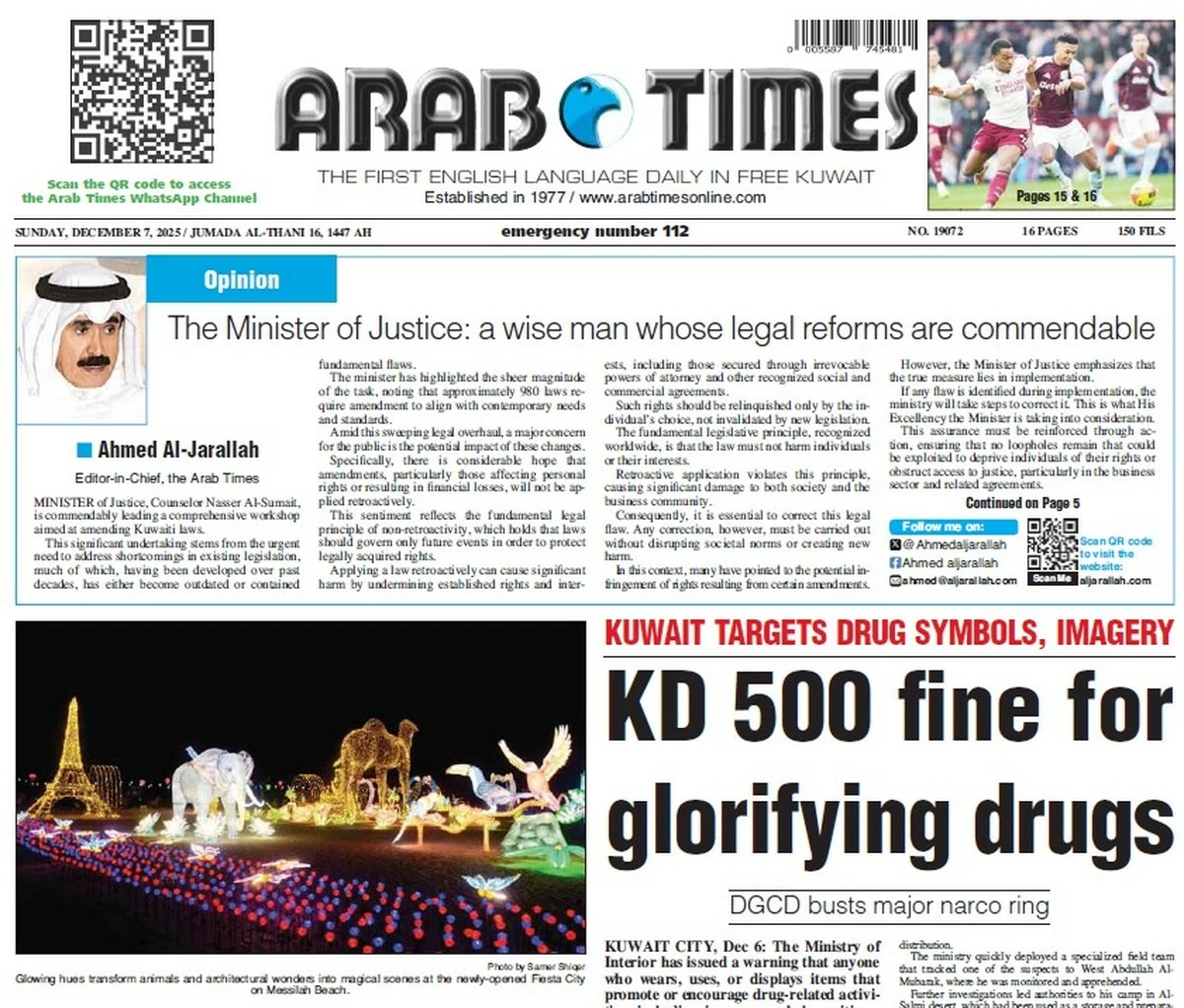20/05/2025
20/05/2025









KUWAIT CITY, May 20: The Embassy of India in Kuwait is organizing an exhibition and talk series titled “Rihla-e-Dosti: 250 Years of India-Kuwait Relationship” from May 19 to 24 at the National Library of Kuwait. According to a press release, the event is being held in collaboration with the National Council for Culture, Arts and Literature (NCCAL) and the Kuwait Heritage Society, along with the National Archives of India and the Ministry of Information and Broadcasting of India. The exhibition was inaugurated on May 19 by the Ambassador of India to Kuwait Dr. Adarsh Swaika, and Director General of NCCAL Dr. Mohammad Al-Jassar.
The opening ceremony included speeches by Dr. Al-Jassar, Ambassador Swaika, and the President of the Kuwait Heritage Society Fahad Ghazi Al-Abduljaleel. A panel discussion followed, with representatives of prominent Kuwaiti merchant families with longstanding historical ties to India. Panelists included Ibrahim Abdullatif Al-Ibrahim, Sulaiman Abdulmohsen Al-Khamees, and Abdullatif Abdulrazzaq, who shared personal insights into their families’ deep-rooted connections with India during the 19th and early 20th centuries. The exhibition offers a rich and diverse collection of items that highlights the deep-rooted and shared history between India and Kuwait. It features rare manuscripts, historical documents, books, and personal letters, along with coins and the Indian rupee, which remained legal tender in Kuwait until 1961.
Also on display are photographs and videos of significant bilateral VVIP visits, as well as artifacts and other cultural items that reflect the longstanding diplomatic and cultural ties between the two nations. To mark the occasion, a special commemorative booklet was jointly released, documenting selected manuscripts and photographs that illustrate the rich history of India and Kuwait, and the high-level visits by leaders between the two countries.
The event was attended by over 200 guests, including prominent Kuwaiti dignitaries from the government, business, media, cultural, academic, and research sectors, ambassadors and members of the diplomatic corps; and a wide cross-section of the Indian community in Kuwait.
The Indian Ambassador Swaika inaugurated the exhibition and delivered a speech in the presence of Dr. Muhammad Khalid Al-Jassar, Secretary General of NCCAL, members of the diplomatic corps in Kuwait, and members of the Indian community. In his speech, the Ambassador expressed his gratitude to Dr. Al-Jassar for partnering with the embassy to jointly organize this exhibition and talk series. He also extended heartfelt gratitude to President of the Kuwait Heritage Society Fahad Abduljaleel, describing him as a main pillar and major contributor to the event.
The Ambassador revealed that Abduljaleel had mentioned the idea of organizing such an event to the Honorable Prime Minister of India during his visit to Kuwait last December. That conversation, he noted, became the driving force behind bringing this initiative to life. He emphasized the deep-rooted and historic bonds between India and Kuwait, which date back to well before the formation of the modern nationstates of both countries. The ambassador explained that as early as the 18th century, Kuwaiti merchants sailed to Indian port cities, carrying goods such as pearls, dates, and Arabian horses, and returning with Indian products like rice, spices, timber, and textiles, not only for use in Kuwait but also for trade in the region. The exhibits on display represent just a small glimpse of the rich, shared heritage between the two nations, much of it from a time before the establishment of their modern identities. This connection is a testament to the historical depth and mutual benefit of India-Kuwait relations.
The manuscripts displayed in the exhibition include documents related to trade at Indian ports, Kuwaiti books on pearls that were printed in India in Arabic and Indian languages such as Gujarati, currency notes and coins that served as legal tender in Kuwait for over a century until 1961, as well as stamps printed in India. Another important section of the exhibition features photographs and memorabilia from high-level visits exchanged between the two countries over the past six to seven decades. The ambassador also highlighted the strong personal ties of Kuwaiti leaders with India, noting that some, particularly Sheikh Abdullah Al-Salem Al- Sabah, used to spend extended periods, even months, in India.
He highlighted the significance of the highly successful visit of the Prime Minister of India H.E. Narendra Modi to Kuwait in December, noting that it marked the end of a long pause in high-level exchanges. He added that India now looks forward to welcoming a visit from the Kuwaiti leadership soon. The Indian Ambassador emphasized that the primary objective of organizing the exhibition was to raise awareness among the youth of both Kuwait and India about the rich and longstanding history shared by the two nations. He expressed appreciation for the strong response from Kuwaiti universities and schools, as many had arranged student visits to the exhibition over its four-day duration to explore the valuable historical items on display.
The ambassador extended an open invitation to the public, encouraging everyone to visit and enjoy this unique cultural experience. He expressed heartfelt gratitude to the National Library of Kuwait, the Kuwait Heritage Society, the National Archives of India, and the External Publicity Division of the Ministry of External Affairs of India for their valuable contributions in making the exhibition possible. Looking ahead, Ambassador Swaika expressed hope that the embassy, NCCAL, and other stakeholders would continue to collaborate on similar initiatives to showcase the multifaceted and unique partnership between India and Kuwait. He concluded by offering special gratitude to the dedicated teams from NCCAL, the National Library, and the Embassy of India for their tireless efforts over the past month in bringing the exhibition to life.


